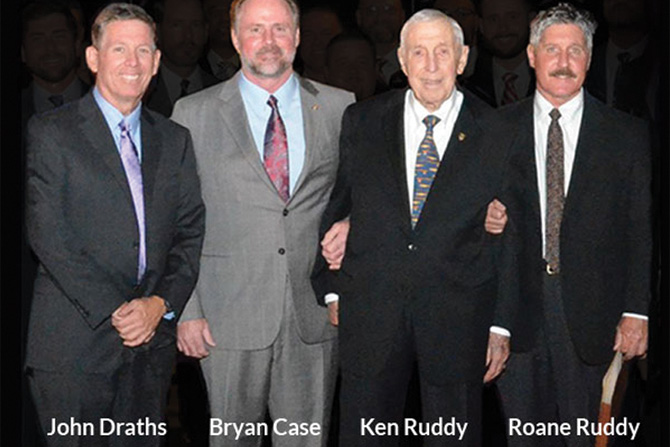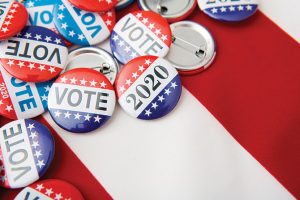By The Texas Automobile Dealers Association
Preparations for the 87th Regular Session of the Texas Legislature began in January of this year with TADA Chair Nancy Harper appointing Bryan Case of Classic Southeast Texas in Beaumont as TADA Legislative Chairman for 2021-2022. While Bryan will admit he ended up in the car business by accident, he is a proud first-generation automobile dealer who grew up on the operations side of the business. Bryan, who now operates eight franchises in Southeast Texas, is a longtime Board Member of TADA and a veteran of the TADA Legislative Committee.
Following the appointment of Bryan and the other members of the committee, a full TADA Legislative Committee call took place in early February, and a meeting of the lobby team occurred in early March. Everything seemed to be on track. The only major uncertainties identified at the time were who would be the next House Speaker after Speaker Dennis Bonnen’s retirement and how would the Legislature find the billions of dollars needed to continue the school and property tax reforms enacted last session. “I felt really good about where we were in the first part of March as we were way ahead of the curve in terms of our preparations. We had identified the major issues we expected, and we were actively considering a number of proposals to assist the dealers in their business operations.”
As everyone knows, events of the last six months have upended any notion of the normalcy we felt in early March. In these past six months, we have witnessed the effects of a global pandemic and the COVID-19 disease infecting millions of Americans, a partial shutdown of our economy as only essential businesses were allowed to remain open in some cases, and Americans staying home to prevent the spread of the virus. The shutdowns subsequently triggered an economic recession and left millions of Americans unemployed. As if this were not enough, oil prices collapsed to the point that they briefly traded for negative $37 a barrel. While the price of oil has since rebounded to around $40 per barrel, the current budget for the State of Texas is predicated on prices per barrel in the low to mid $50s.
Despite the shutdown and economic turmoil, the franchised auto dealers in Texas remained open for business as essential businesses. They kept their employees working, often with the assistance of the Federal PPP program enacted under the CARES Act. Quickly after sales fell precipitously in late March and early April, Texas dealer sales rebounded as the economy started to open back up after the April shutdown in Texas. Despite the sales recovery, inventory levels of new and used vehicles and the long-term effect of the pandemic on jobs and the economy continue to cloud the future.
Uncertainty abounds on the legislative and political fronts as well. The Capitol has been closed to the public since mid-March and Interim hearings have been relegated mainly to requests for information from state agencies and interested stakeholders. Lawmakers continue to struggle with how the Chambers and building can safely handle the return of lawmakers, staff, and visitors in January when the session begins. And while it appeared at the beginning of this year that the Republicans would maintain their majority in the Texas House, recent polling suggests that Democrats could gain the nine seats they need to take control of the House Chamber, something they haven’t had since 2002. Adding to this disruption is another House Speaker’s race to follow the election, and this will likely cause additional organizational delays for the session.

“I think if you told any of us at the beginning of the year what we would be facing e this year and potentially next year in our business, the economy, and government, no one would have believed you.” For now, Bryan suggests a steady course for the dealers and their agenda. “We are going to prepare for a normal session, but we are not necessarily expecting one. We will be prepared and flexible enough to adapt to any changing circumstances on the ground.”
With many businesses and individuals still hampered by the pandemic and unemployment, the Texas budget has been dramatically affected. In the Texas Comptroller Glenn Hegar’s budget update released in mid-July, he projected a 9.5% decrease in revenues from his previous estimate, swinging the bottom line from a $3 billion surplus to a $4.5 billion deficit. Under the recent projections, Hegar has sales tax revenue, which accounts for 57% of revenues, holding even with last biennium and motor vehicle sales and rental taxes running slightly behind. The big hits are to the oil and gas production taxes and hotel occupancy taxes. With a projected biennium ending balance of $8.8 billion in the Economic Stabilization Fund (Rainy Day Fund), Hegar still anticipates having enough flexibility to manage through the current budget cycle. Comptroller Hegar will provide an update for lawmakers in January 2021 for both 2020-2021 and 2022-2023.
The budget is the only must-pass bill for the Legislature each session. And looking at a potentially large deficit, revenue considerations will likely be on the table. Last session, Members of the Legislature seriously contemplated an increase in the state sales tax rate to fund future property tax relief. There was also an effort to remove sales tax exemptions, and some Members have already headed down that road again. On the transportation funding front, there will likely be renewed interest in finding additional revenues to fund Texas road building, including electric vehicle fees to approximate the number of gas tax dollars other vehicles provide. “I think a lot of things are on the table now that were probably not earlier in the year, and we know where the risks are as businesses and dealers.”
One should expect a good amount of legislative attention this upcoming session on COVID-19 related legislation. Legal liability protection for COVID 19 related claims remains a key question for the business community, particularly if the issue remains unresolved at the Federal level. The Legislature will also likely seek to permanently eliminate government requirements that have been suspended during the pandemic. And the efficiency of government operations at all levels in response to the pandemic will be evaluated, providing opportunities to improve processes throughout the government. Dealers should also expect that agencies, including the Department of Motor Vehicles, will have their own wish list of legislative items ready.
As for dealer specific issues, Case indicates there are three main buckets of interest to the committee. One, he expects manufacturer ownership of dealerships to remain a hot issue, particularly with all the new manufacturers coming to market. Second, there are some dealership priorities focused on ensuring that dealers are treated fairly under the franchise laws and not mistreated by their manufacturers and other related entities. And third, we have identified some other items that give us opportunities to support and perhaps champion to try and get them over the finish line. Whether on offense or defense, there are plenty of issues out there, but it remains to be seen what the real bandwidth of the 87th Legislature will be come January.
“Despite the uncertainty, I consider it a great privilege to lead the committee during this challenging time, and I am very thankful for the team we have at TADA to guide us through the session. We have a great committee appointed by Nancy Harper, and I look forward to working with them and 2021 TADA Chair April Ancira next year at the Capitol.”
The Texas Automobile Dealers Association
This story appears in Issue 5 2020 of the Dealers’ Choice Magazine.







